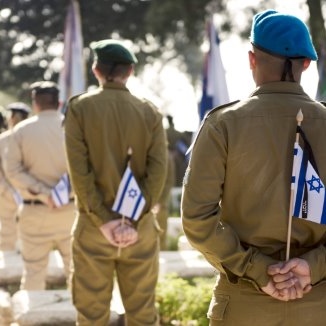click to dowload our latest edition
CLICK HERE TO SUBSCRIBE TO OUR NEWSLETTER


Published
7 years agoon
By
adminPAULA SLIER
Pogrund had the respect and confidence of leaders such as Nelson Mandela who used to call him “Benjy Boy”. I remember him chuckling at the memory of being viewed by Mandela’s children as their “Jewish uncle”.
Pogrund immigrated to Israel 20 years ago and as we chatted in the Yakar Centre for Social Concern that he founded in Jerusalem, he reflected on the Israeli-Palestinian conflict. He said something I’ve never since forgotten: “Both Israelis and Palestinians have justice on their side,” he observed. “Both have truth. Both have pain.”
His words are especially poignant now as very different celebrations and commemorations are taking place across Israel and the Palestinian territories over the exact same events in history. If ever we need a reminder of just how polarised the sides are, now is that time.
This is a year of anniversaries. Israelis are celebrating the 50th anniversary of their victory in the Six Day War, the centennial of the signing of the Balfour Declaration and the 70th anniversary of the UN Partition Plan for Palestine.
But come May 15 and Palestinians will commemorate Naqba Day – “Day of the Catastrophe” – in remembrance of the displacement that preceded and followed Israel’s Declaration of Independence. In December they will also mark the 30th anniversary of the First Intifada – “Palestinian Uprising” – that started in Gaza and spread rapidly throughout the Palestinian territories.
But perhaps no event conflates these two very different narratives of one history more than what happened this past week in Tel Aviv.
For 12 years an alternative Yom Hazikaron ceremony remembering both sides of the Israeli-Palestinian conflict has been held. It is controversial because while most of Israel stands to attention for the official Memorial Day Service (in the past year 97 Israelis were added to the list of fallen soldiers, 37 of them disabled IDF veterans who succumbed to their injuries, as well as soldiers who died off the battlefield) thousands of Israelis were paying their respects to Palestinians and Israelis who’ve died over the years.
Except that there were no Palestinians present. Ever since a Palestinian teenager entered Israel last month with a one-day pass and attacked four people in Tel Aviv with a pair of wire-cutters, Israeli authorities have cancelled all one-day passes until further notice.
The more than 200 Palestinians who were supposed to attend the ceremony, linked up via video. Naturally, Israeli organisers were outraged saying the participation of Palestinians was important as “a message of hope in a society consumed with despair”. But the dozens of right-wing Israelis who protested outside the event, were also outraged. They called those present “Nazis” and “traitors” – highlighting the deep divides between Israelis themselves.
One of the co-sponsors of the event was the “Parents Circle”, an organisation that brings together Palestinians and Israelis who have lost loved ones to the conflict. Its spokesman, former South African Robi Damelin, is another interviewee whose words have remained with me over the years.
Robi’s uncle, Judge Maisels, defended Mandela in the Treason Trial. She immigrated to Israel in 1967 to volunteer on a kibbutz. Fifteen years ago, her son, David, was killed by a sniper while on reserve duty in the Israeli army. He was 28 years old.
Sitting in her Tel Aviv home, she showed me videos and photographs of David. With her pain still so raw, I remember her saying she understood from the start she had a choice – to seek revenge, which instinctively she was against – or to spread the message of reconciliation, tolerance and peace. She chose the latter.
“The pain is the same pain,” she reflected. “Whether it’s an Israeli mom, or a Palestinian mom, if you’ve lost a child, the pain is the same pain.”
One of the first stories I ever reported on from Israel was about two 15-year-old girls, a Palestinian and an Israeli, who shared the same ward in Jerusalem’s Hadassah Hospital.
Marian Saadeh had been travelling with her parents and 12-year-old sister Christine to a supermarket in Bethlehem late one night when Israeli soldiers opened fire, mistaking their car for one they’d been tipped off was carrying Hamas members.
“Why did they shoot at us?” she whispered to me, her big brown eyes clouding over with tears. “We didn’t make anything. Why did they shoot at us?” A bullet was removed that morning from Marian’s right leg. Hours later her sister was declared dead.
In a nearby bed, Adi Huja, was waiting for the 19th operation she needed after surviving a suicide bombing in Jerusalem’s main pedestrian mall a year earlier.
“My whole life has changed,” she smiled sadly, “I need crutches all the time and have stopped going to school because I need to have so much medical care.”
The pain is the same pain. As celebrations and memorials take place across Israel and the Palestinian territories, it would do well for both sides to remember that.
Paula Slier is the Middle East Bureau Chief of RT, the founder and CEO of NewshoundMedia and the inaugural winner of the Europcar Woman in Leadership Award of the South African Absa Jewish Achievers.
